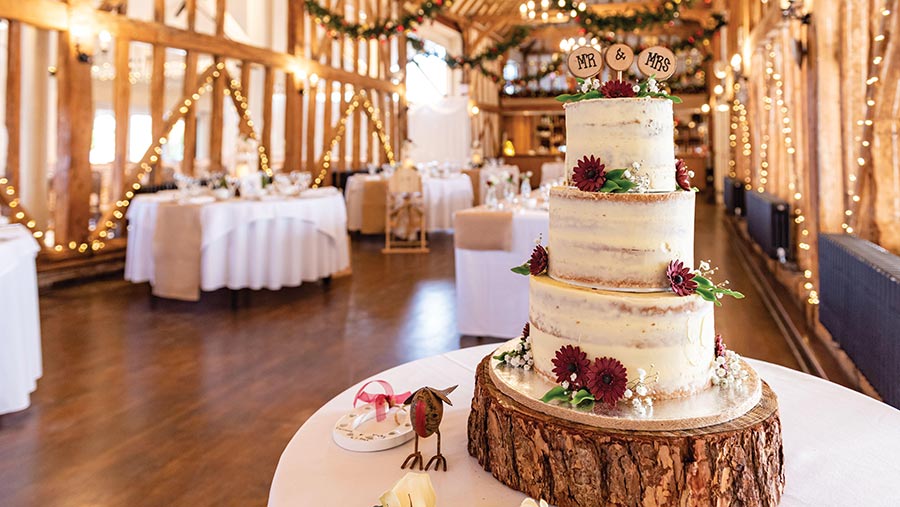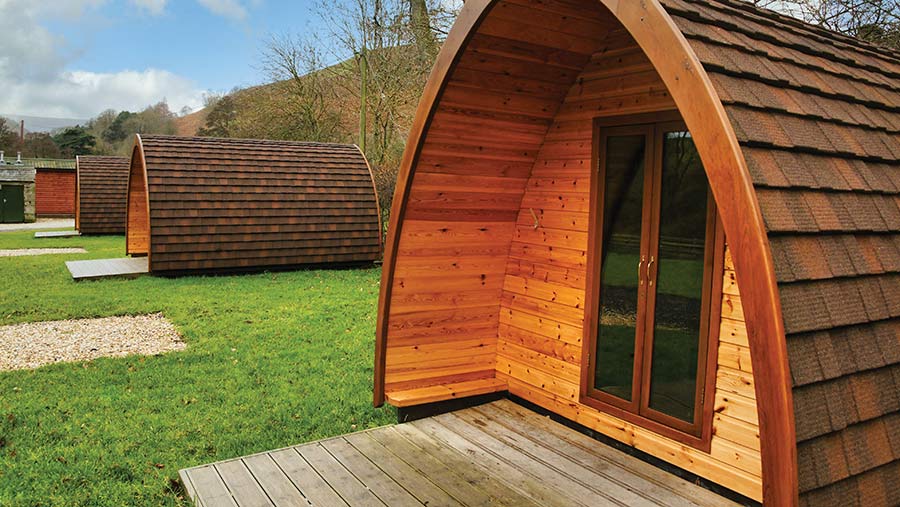Tax rulings show importance of diversification planning
Successfully claiming business property relief (BPR) from inheritance tax (IHT) on diversified farm enterprises depends largely on demonstrating that the business is a trading operation, rather than an investment.
Most of the cases taken to various levels of tax tribunal, so far, have centred on the furnished holiday lettings sector and whether the owners or managers of the business provided sufficient levels of service to establish that these were trading businesses.
There is no clear line between investment and trading, so each case is considered in the light of its background and circumstances.
Wedding venues and glamping pods have lately come under scrutiny.
See also: Practical tips on planning applications when diversifying land

Ventures must pass the trading test to qualify for business property relief © Jason Chillmaid/Alamy Stock Photo
One of the most recent cases saw a BPR claim for a farm-based wedding venue rejected by the first-tier tax tribunal.
In considering this case, the judge said that the provision of a wedding venue might range from the hire of a community or village hall at one end of the spectrum, to a fully serviced conference venue at the other end.
He gave the example of a community hall which might offer a kitchen, tables and chairs, and may have wedding and event licences.
While there may be a caretaker, basic cleaning and an administrator who may be able to recommend suppliers, the wedding couple would need to engage all the suppliers themselves.
At the other end of the spectrum, the fully serviced conference venue may be able to provide a complete wedding event package.
Business property relief advice
For business property relief (BPR) to apply, a high level of service must be provided, essentially going above and beyond what might be expected.
This was demonstrated successfully in a furnished holiday lettings (FHL) case known as Graham.
Deciding factors were a pool, a sauna, the provision of bikes, and especially the personal care lavished upon guests by their host Mrs Graham. It is unusual for FHL cases to qualify for BPR.
For wedding venues, the venue owner should be in complete control of events including catering, even if the actual catering facility is subcontracted to a specialist third party.
Allowing venue users to contract direct with third parties is likely to deny BPR.
If BPR is sought, third parties involved in the wedding should be either employed by or contracted to the owner.
The contract or invoicing between the owner and the customer should clearly reflect this as it may be many years before evidence is presented to HMRC.
Source: Chavereys, accountant
Tribunal case background
The tribunal case began when, following the death of owner Mrs Helen Butler, a claim for BPR on Hampshire wedding venue Clock Barn – an enterprise which was part of a limited liability partnership (LLP) – was rejected by HMRC.
Representatives of Mrs Butler’s estate and of her late husband’s estate asked for a review of the decision.
However, HMRC stood by its original determination, on which the estate representatives then appealed to the first-tier tax tribunal.
By 2015, about 95 weddings a year were being held in Clock Barn at Tufton Warren Farm.
Between 2005 and 2008, renovations and additions included a commercial kitchen, preparation room and toilets, although the kitchen was not fully equipped.
A further building had been converted into a honeymoon suite in 2014 and the farmhouse became nine-bedroom accommodation for wedding guests.
While the business had developed over many years, with Mrs Butler and her staff providing many of the services, the tribunal judge looked primarily at the two years leading up to Mrs Butler’s death.
During this period, a new caterer, Galloping Gourmet, was appointed exclusively and gradually took over event management responsibilities on wedding days.
The same firm took on many other roles that Clock Barn staff had previously carried out, such as holding alcohol licences and being “responsible persons” for the purposes of the wedding venue licence.
Separate contracts
This had a bearing on the tribunal decision, as did the fact that customers were required to contract separately with the caterers and pay them directly.
In the period under review, the catering company also took on much of the liaison with suppliers and supervision of their setting-up at the venue.
The only fee paid directly to Mrs Butler’s business was that for the use of Clock Barn as a wedding venue.
The judge also noted that some of the work by Mrs Butler’s business relating to advice, open days, and showing around prospective customers formed part of the marketing of Clock Barn.
He considered this would be part of the business of holding investments, as were other elements of their work, such as traffic marshalling on wedding days.
The judge found that the Clock Barn business had always fallen on the village or community hall side of the spectrum, and away from the fully serviced conference venue.
He said that before caterer Galloping Gourmet had been appointed, the level of business activities undertaken by the LLP may have been more significant, even then it was still a business of holding investments.
“I find that at no point did Clock Barn provide amenities and services that went significantly beyond the amenities that are provided in a property held predominantly for investment purposes.
“I find that such of the amenities and services that were provided by the LLP were not exceptional in their nature.”
He said that the payment of a fee mainly for the use of Clock Barn, its garden and grounds placed the business primarily as an investment.
“When I step back and look at the business as a whole, I find that the wedding venue business of the LLP was predominantly for the purpose of holding its property as an investment.”
Basic glamping pods qualify for capital allowances

How pods are serviced and sited will affect their status for tax relief © David Pimborough/Alamy Stock Photo
Capital allowances were at the heart of a case over glamping pods, involving a tour operator providing residential holidays for schools.
Twenty-six pods were bought and a claim made for plant and machinery capital allowances under the annual investment allowance (AIA).
This was rejected by HMRC, leading to an appeal to the first-tier tax tribunal.
The pods had electric hookups for lighting and were sited on a pre-existing hardstanding area, on a wooden frame attached to breeze blocks cemented to the ground.
They were anchored, but not fixed. Twenty of these were basic pods for student accommodation for sleeping and shelter only.
The other six pods, called “teacher pods” in the case, were of a higher standard, with a small kitchen, running water, flushing toilets and foul water drains. This meant they were fixed.
The tribunal agreed that AIA was allowed on the basic pods because they were not substantial enough to qualify as buildings.
They were not living accommodation, nor were they fixed to the ground and nor did they look like a conventional building, and they were not significantly more than a tent.
However, it considered that the teacher pods did not qualify for capital allowances because they were fixed structures.
Hampshire accountant Julie Butler of Butler & Co described this as a very pertinent case.
“The interest is growing in wild camping with very little luxury, and with camping days without planning permission being extended to 60 days, there is emphasis on moveable camping pods,” she says.
“The devil is often in the detail with capital allowances. These two types of pod looked identical from the outside, but their internal features made the teacher pods more like living accommodation than the temporary shelter aspect of the basic pods.”
This tribunal decision may support arguments for suitable farm diversification camping pods to be moved to different areas of the farm, keeping evidence of this, she suggests.
“Pods are so useful in so many areas of farm diversification – farm tours, farm education and farming for the environment.”
Both permitted development rights and the more long-term planning permission should be considered.
